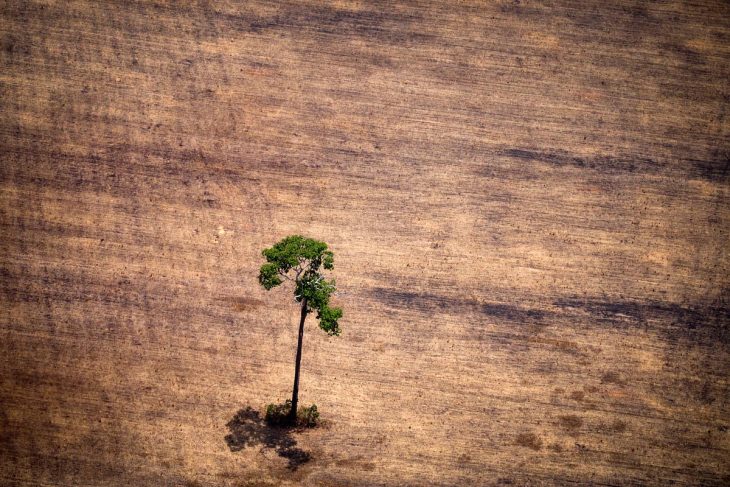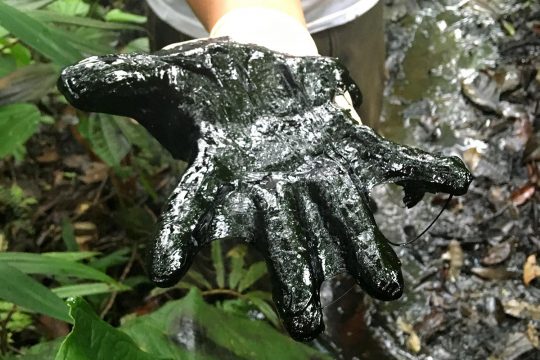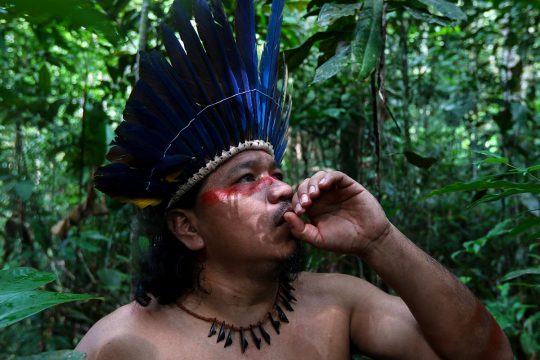The situation in Brazil illustrates a sad fact: none of the mechanisms in place make it possible, as it stands, to effectively combat ecocide and associated criminal practices. Data published by the Brazilian Space Agency reveal that in June 2019, deforestation in the Amazon increased by 88% compared to June last year. This trend has exploded since November 2018 with the election of Jair Bolsonaro, who has pledged to promote the development of the Amazon by opening it up more to agricultural and mining investments and putting an end to the repression of environmental crimes.
His government has been following up on its promises. The measures taken and speeches delivered since he came to power in January 2019 have targeted the National Indian Foundation (FUNAI), the Institute of Environment and Renewable Resources (IBAMA) and the Chico Mendez Institute (ICMBio). These federal agencies are responsible for the conservation and protection of forests, biodiversity and indigenous rights, guaranteed by Article 231 of the Brazilian Constitution.
On the very day of his investiture, the Brazilian president signed provisional measure 870, which aims to transfer responsibility for demarcation of indigenous territories from the FUNAI to the Ministry of Agriculture, known to be under the notorious influence of agribusiness which wants more deforestation. Another example: in April 2019, Bolsonaro issued a decree creating a new body to assess IBAMA's sanctions, de facto slowing down their implementation. In parallel, Bolsonaro and his Minister of the Environment orchestrated a "clean-up" of control authorities such as IBAMA and ICMBio. In fact, the director of IBAMA was dismissed in June, as were many ICMBio staff members. On the ground, these policies have paralyzed the demarcation of protected areas and deprived these federal agencies of resources. Officials responsible for enforcing existing laws to protect indigenous peoples and combat deforestation report harassment.
The climate of impunity created by Bolsonaro encourages violence against Indians and their territories. Gold panners and other traffickers in precious woods or minerals have a field day.
These measures, which are obviously unconstitutional, most often end up being invalidated by Congress or by a judge. Nevertheless, their "temporary" implementation is sufficient to cause havoc in the Amazon forest. According to Claudio Angelo, a researcher at Observatório do Clima, "the number of fines imposed from January to May 2019 for environmental damage is the lowest in 11 years and inspection operations carried out have dropped by 70% compared with 2018". Environmental crimes are practically no longer punished. The climate of impunity created by Bolsonaro encourages violence against Indians and their territories. Gold panners and other traffickers in precious woods or minerals have a field day. At the same time, mining, industrial activities and major infrastructure projects have resumed in these protected areas, such as the rehabilitation of a motorway through the Amazon (the BR-319 road, built under the military dictatorship in the 1970s) or the construction of the Sao Liuz de Tapajos and Bello Monte dams. “Invasions of indigenous territories and deforestation are now out of control," warns Marcos Wesley of the NGO Social-Environmental Institute, in an interview with French newspaper Le Monde.
Start prosecutions at the International Criminal Court?
In a recent message, Pope Francis said these practices were the expression of a "blind and destructive mentality that prefers profit to justice". They are motivated by "the illicit exploitation of natural resources" or "the illicit appropriation of land", and can lead to mass violence, suggests the ICC's policy document on the selection and prioritization of cases, published in September 2016 by Prosecutor Fatou Bensouda.
Are these practices likely to give rise to legal proceedings before this court? The first obstacle to be overcome is the Court's jurisdiction. Brazil has been a party to the ICC since 20 June 2002. The massive deforestation practices that have occurred on its territory since or prior to the election of Jair Bolsonaro and their consequences on Amazonian Indians must constitute one of the crimes referred to in Article 5 of the Rome Statute.
Article 5 covers crimes of genocide, crimes against humanity, war crimes or crimes of aggression. The crime of "ecocide" is not included and the widespread, lasting and serious environmental damage resulting from the destruction of trees and biodiversity in Amazon ecosystems does not therefore fall within the jurisdiction of the ICC or any other international court. As for the qualifications of crime of aggression or war crimes, they can only be used in the presence of an armed conflict.
What about the qualification of genocide or crimes against humanity? As Nicolas Hulot, former French Minister of Ecological Transition, recalled in an interview with Le Monde on June 30, mass deforestation of the Amazonian forest is associated with "multiple and repeated abuses against the Amazonian Indians since the foresters, miners and oil companies are allowed to act without regard for these populations and their rights. This continues a form of genocide that has happened throughout the history of the Indians”.
The cultural, spiritual and social identity of the Amazonian Indians is rooted in the forest, on which they depend and which they protect. To destroy it is to destroy them. But does this mean that it is genocide?
The cultural, spiritual and social identity of the Amazonian Indians is rooted in the forest, on which they depend and which they protect. To destroy it is to destroy them, in whole or in part. But does this mean that it is genocide? This qualification can only be retained if the intent to destroy them as an ethnic group has been expressed by an individual and this intent has been proven.
Is it a crime against humanity? Persecution? Forced displacement? According to the Rome Statute, these qualifications require prior proof that victims are the target of a systematic or widespread attack, knowingly launched, and in accordance with or in pursuit of the policy of a State or organization aimed at such an attack.
However, some statements by Jair Bolsonaro say his policies are aimed at assimilating Amazonian Indians. According to his colonialist vision, the Indians want to integrate into society, play football, access the Internet, wash with soap and be a Brazilian like any other. In any case, they must "adapt or disappear". Such an assimilation process, once promoted under the military dictatorship, violates the fundamental rights of indigenous peoples guaranteed by the Brazilian Constitution.
But is this enough to bring sufficient evidence of the elements required by the ICC for the existence of genocide or a crime against humanity? Cases brought to the attention of the Court must, in order to be considered admissible, meet criteria of complementarity, gravity and conformity with the interests of justice, as defined by the Statute and case law. To date, nothing is less certain. Several communications associated with comparable environmental crimes have already been forwarded to the ICC Prosecutor. At least one of them, filed in 2014, refers to land grabbing, deforestation and their disproportionate impact on indigenous minorities in Cambodia. The Prosecutor, without rejecting it, has still not taken any action.
Even if the Prosecutor wished to proceed, one last obstacle would have to be removed, and not the least: the authorization of the Pre-Trial Chamber. Until now, this has been a kind of "formality" to check whether the conditions of admissibility and jurisdiction required by the Statute were met. This approach appears to have changed since the April 12, 2019 decision, in which the judges rejected the Prosecutor's request to investigate in Afghanistan, on the grounds that it would not serve the "interests of justice". According to this decision, an investigation would only be in the interests of justice if the Prosecutor demonstrates that she can effectively conduct the investigation and successfully prosecute it within a reasonable time, which depends in particular on the cooperation of local authorities. If this decision were to be confirmed on appeal, it would result in an additional obstacle to any attempt to prosecute before the ICC.
As it stands, international criminal law does not seem to be adapted to the legal challenges raised by the climate and environmental issues of the contemporary world.
Inadequate international law
For all these reasons, prosecuting the crimes associated with massive deforestation before the ICC is likely to lead to a deadlock. As it stands, international criminal law does not seem to be adapted to the legal challenges raised by the climate and environmental issues of the contemporary world. And it is not just about the obstacles identified above.
In the case of mass deforestation, it is difficult to attribute responsibility for practices associated with an individual since they are often the result of strategies implemented by criminal groups (such as drug traffickers in Colombia) or transnational corporations, such as in the Democratic Republic of Congo, where the Virunga Natural Park is threatened by the exploitation of the British oil company Soco, or in Ecuador, as shown by the Texaco-Chevron case.
In Brazil, it is the agribusiness companies that destroy the forest to extend agricultural land. Those in the energy and mining sectors are interested in gold and other minerals, which are mined without consideration for environmental or even human impact. These private companies are among the most ardent defenders of the "assimilation" of the Amazon Indians. In addition, many non-Brazilian companies, such as Alstom and GDF Suez, are involved in the construction of dams in the Amazon basin.
But the ICC does not recognize the criminal liability of corporations. Only individuals can be prosecuted before it. While some call for States Parties to amend the Rome Statute to include criminal liability of corporations and the crime of ecocide, such amendments seem unlikely at this stage.
While international law provides for other mechanisms, they do not have any real binding force. Brazil has accepted the adjudicatory function of the Inter-American Court of Human Rights, which is responsible for interpreting the corresponding Convention. While this court has already been seized to assert the ecological interests of indigenous peoples, it was not necessarily in relation to situations in Brazil. In any event, the scope of its interpretations is limited by restrictions relating to the functioning of the inter-American system, which decisions are not binding.
Another example related to deforestation is the REDD+ mechanism developed by the States Parties to the UN Convention on Climate Change. This new mechanism aims to compensate reduction of emissions due to deforestation and forest degradation. Its effectiveness remains too limited since its implementation is not binding and depends on the political will of States parties to the Paris Agreements. In general, in environmental and climate matters, international justice is not up to the challenge.
However, all the warning lights are flashing. Do we need to remember the heat waves that struck the northern hemisphere between June and July 2019? A new heat record was set in Alaska, with 32° degrees in Anchorage. India is facing the worst heat crisis in its history with temperatures exceeding 50° in the north. In Europe, temperatures have risen to 40° in many countries. According to a UN report dated 25 June 2019, climate change could displace 140 million people by 2050. Many will have to choose between famine and migration.
Climate change could become a major factor in the emergence of new armed conflicts. These parameters are becoming increasingly part of international relations, thanks in particular to pressure from civil society. Let us hope that this will be enough to reverse the trend and advance the rule of law and international efforts in this area.
 MAUD SARLIEVE
MAUD SARLIEVE
Maud Sarliève is a lawyer and lecturer at the University of Paris-Ouest-Nanterre. She worked for the ECCC Office of Investigating Judges in Cambodia, for the EULEX Special Prosecutors in Kosovo and for a Defence team at the Special Tribunal for Lebanon.







